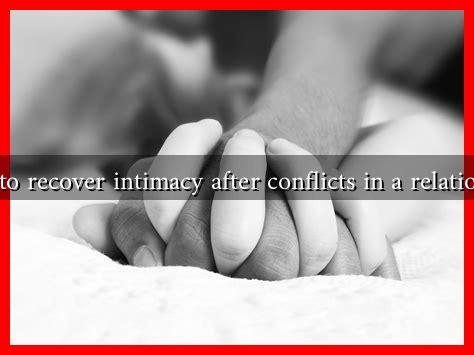-
Table of Contents
How to Recover Intimacy After Conflicts in a Relationship
Conflicts are an inevitable part of any relationship. They can arise from misunderstandings, differing values, or external stressors. However, the way couples handle these conflicts can significantly impact their intimacy. Recovering intimacy after a disagreement is crucial for maintaining a healthy and fulfilling relationship. This article explores effective strategies to rebuild intimacy following conflicts, supported by research and real-life examples.
Understanding the Impact of Conflict on Intimacy
Conflict can create emotional distance between partners, leading to feelings of resentment, anger, or sadness. According to a study published in the Journal of Marriage and Family, couples who engage in constructive conflict resolution tend to have higher levels of intimacy and satisfaction in their relationships. Conversely, unresolved conflicts can lead to a breakdown in communication and emotional connection.
Steps to Rebuild Intimacy
Recovering intimacy after a conflict requires intentional effort from both partners. Here are some effective strategies:
- Open Communication: After a conflict, it’s essential to discuss feelings openly. Use “I” statements to express how you feel without blaming your partner. For example, say, “I felt hurt when…” instead of “You made me feel…”.
- Active Listening: Make a conscious effort to listen to your partner’s perspective. Reflect back what you hear to ensure understanding. This can help validate their feelings and foster empathy.
- Apologize and Forgive: If you’ve made a mistake, a sincere apology can go a long way. Similarly, be willing to forgive your partner for their missteps. Holding onto grudges can hinder intimacy.
- Revisit Positive Memories: Remind each other of the good times you’ve shared. This can help shift the focus from conflict to connection. Consider looking through old photos or reminiscing about special moments.
- Engage in Physical Affection: Physical touch can help bridge emotional gaps. Simple gestures like holding hands, hugging, or cuddling can reignite feelings of closeness.
- Set Aside Quality Time: Schedule time for each other to reconnect. Engaging in activities you both enjoy can help rebuild the emotional bond. Whether it’s a date night or a weekend getaway, prioritize your relationship.
Case Study: The Johnsons’ Journey
Consider the case of the Johnsons, a couple who faced significant challenges after a heated argument about finances. Initially, they struggled to communicate, leading to weeks of emotional distance. However, they decided to implement the strategies mentioned above. They began by having an open conversation about their feelings, which allowed them to express their frustrations without blame. They also made it a point to engage in weekly date nights, which helped them reconnect and enjoy each other’s company again.
Over time, the Johnsons found that their intimacy improved significantly. They reported feeling more connected and understood, demonstrating the effectiveness of intentional efforts to recover intimacy after conflict.
Statistics on Relationship Recovery
Research indicates that couples who actively work on resolving conflicts are more likely to experience long-term satisfaction. A study by the American Psychological Association found that couples who practice effective communication techniques are 50% more likely to report higher levels of intimacy and relationship satisfaction.
Conclusion: The Path to Reconnection
Recovering intimacy after conflicts is not only possible but essential for the health of a relationship. By focusing on open communication, active listening, and engaging in shared activities, couples can rebuild their emotional connection. Remember, conflicts are a natural part of any relationship, but how you handle them can make all the difference. By implementing these strategies, you can foster a deeper intimacy that withstands the tests of conflict.
For further reading on relationship dynamics and conflict resolution, consider exploring resources from the American Psychological Association.

